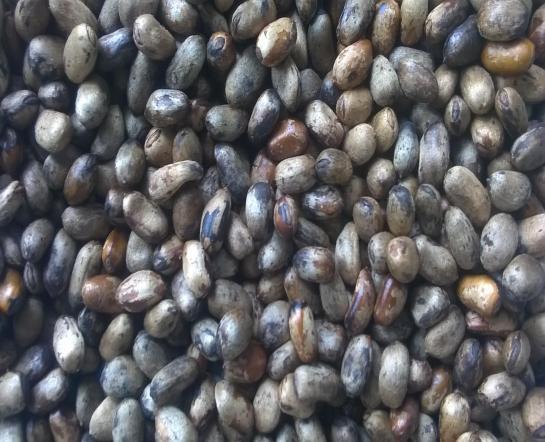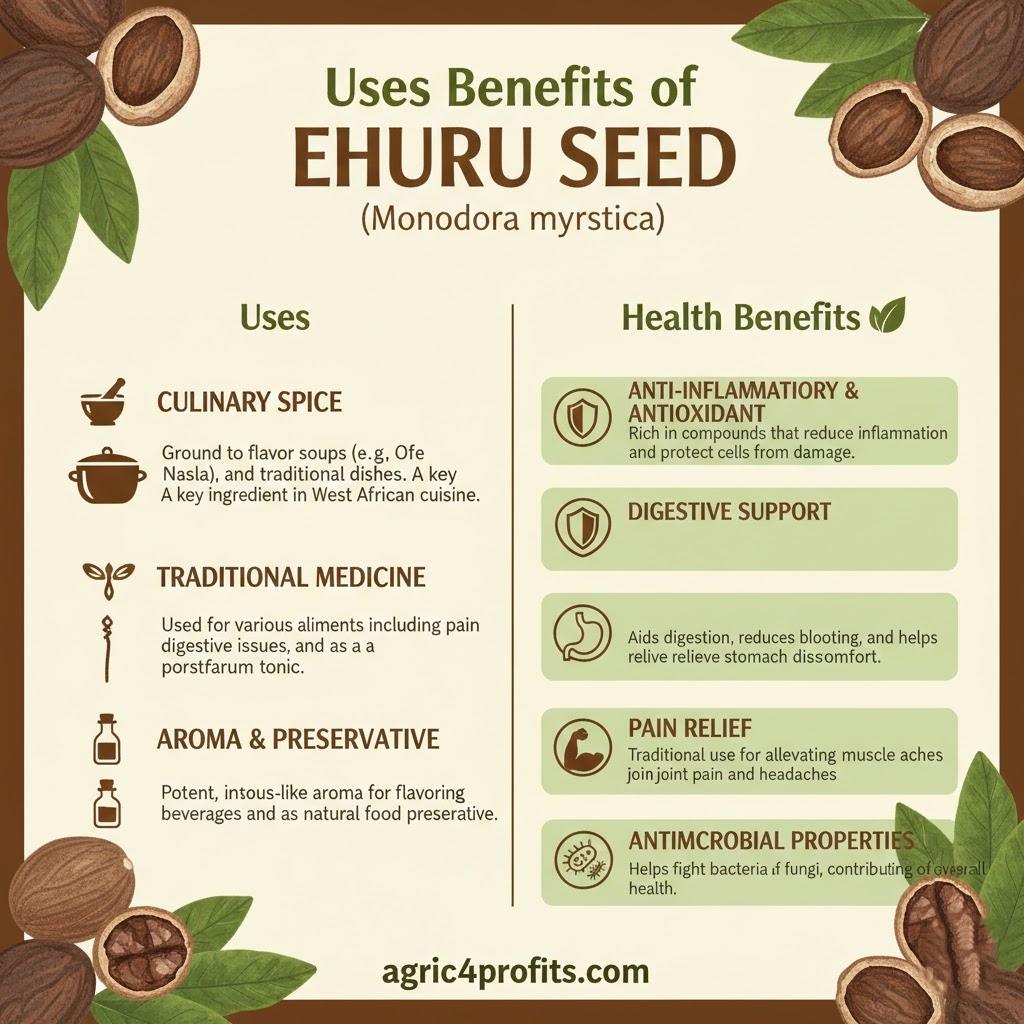Ehuru seed, often referred to as African nutmeg or calabash nutmeg, is a spice derived from the tree Monodora myristica. It has been cherished in traditional West African cuisine and herbal medicine for its unique flavor and numerous health benefits.
While prized for its bold, aromatic presence in dishes, the benefits of ehuru extend beyond culinary use. Its nutritional value and potential health advantages make it worth exploring, particularly for fertility, overall wellness, and even pregnancy support.
1. Ehuru seeds close-up: Ehuru seeds, also known as African nutmeg or Monodora myristica, are aromatic seeds valued for their health and culinary properties.
Scientific Evidence and Case Studies on Health Benefits of Ehuru Seeds
1. Antioxidant properties: Ehuru seeds demonstrate strong antioxidant activity that helps neutralize free radicals and reduce oxidative stress linked to chronic diseases.
2. Anti-inflammatory effects: The seed’s compounds exhibit potent anti-inflammatory properties, aiding in the reduction of inflammation associated with conditions like arthritis and respiratory issues.
3. Antimicrobial activity: Ehuru shows antibacterial efficacy against various pathogens, supporting its traditional use in fighting infections.
4. Digestive and flavor enhancement support: Studies highlight ehuru’s role in flavor extraction and traditional digestive remedies through stimulating compounds.
5. Potential reproductive support: Research indicates ehuru may enhance sexual function and reproductive health parameters in experimental models.
Fertility Benefits of Ehuru Seeds

One of the most fascinating aspects of ehuru seed is its historical association with fertility. For generations in traditional settings, ehuru has been used with the belief that it enhances reproductive health for both men and women.
It is thought that compounds in ehuru help regulate hormones and improve blood flow, particularly to reproductive organs, potentially increasing conception chances.
While scientific research is still emerging to support traditional knowledge, many rely on ehuru to support fertility. This includes improving egg quality, boosting sperm health, or promoting a healthier reproductive system overall.
2. Ehuru and fertility support: Illustration related to the sexual function-enhancing potentials of Monodora myristica (ehuru) in traditional contexts.
General Health Benefits of Ehuru Seeds
Ehuru seed offers a wealth of advantages for overall well-being. It contains antioxidants vital for combating free radicals, which cause oxidative stress and contribute to inflammation, premature aging, and chronic diseases like cancer and heart disease.
Including ehuru in the diet helps neutralize these molecules and reduce associated risks. Its antioxidants also support the immune system to fight infections.
Additionally, ehuru has anti-inflammatory properties important for managing arthritis, joint pain, and other inflammation-related issues. Chronic inflammation underlies many health problems, including autoimmune diseases and digestive disorders.
Regular consumption may reduce inflammation, leading to improved comfort, mobility, and quality of life. Traditional healers have long recommended it for aches, pains, and digestive discomfort.
Ehuru also soothes the digestive system, serving as a remedy for bloating, indigestion, and constipation.
Ehuru Seeds for Heart and Respiratory Health
Ehuru contributes to heart health through its antioxidant and anti-inflammatory properties, potentially reducing cardiovascular disease risk. Antioxidants lower blood pressure, reduce cholesterol, and protect the heart from oxidative damage that can lead to heart attacks or strokes.
For respiratory health, ehuru has traditionally treated coughs, colds, and asthma. Its anti-inflammatory effects may reduce congestion and open airways, easing breathing for those with chronic issues.
Read Also: How to Achieve Ideal Pineapple Spacing for Healthy Growth
Ehuru Seeds in Pregnancy

Ehuru’s role in pregnancy intrigues many familiar with traditional remedies. Some believe moderate consumption offers benefits like boosting the immune system and reducing inflammation-related discomforts such as joint pain or swelling.
However, pregnancy is sensitive, and caution is essential. While traditional beliefs suggest advantages, pregnant women should always consult a healthcare provider before using ehuru or any herbal remedy.
Each pregnancy is unique, and potential benefits must be weighed carefully against safety.
3. Traditional use in pregnancy contexts: Image depicting traditional herbal preparations, relevant to ehuru’s cautious use during pregnancy in some practices.
Culinary Applications of Ehuru Seeds: How to Incorporate It into Your Diet
Ehuru seeds add rich, nutty flavor to many dishes.
1. In soups and stews: Roast and grind ehuru into powder, then add to simmering soups like pepper soup or vegetable stews for earthy depth.
2. For meat dishes: Use in spice rubs or marinades for chicken, goat, or beef, combining with garlic, ginger, and other spices.
3. In rice and grains: Add ground ehuru while cooking jollof rice or sprinkle as a finishing touch.
4. In baked goods: Incorporate into cakes, cookies, or bread as a nutmeg-like substitute for warmth.
5. In beverages: Infuse into herbal teas, coffee, or hot chocolate for spicy notes.
6. In sauces and marinades: Add to tomato sauces, gravies, or vinaigrettes toward the end of cooking.
7. With vegetables: Sprinkle over roasted or sautéed vegetables for enhanced flavor.
8. For preservation: Use antimicrobial properties in traditional food preservation methods.
4. Ehuru in cooking: Ehuru seeds used in traditional West African dishes like soups and stews for flavor enhancement.
Read Also: History and Significance of Cabbage
Summary of Health Benefits of Ehuru Seeds

| Aspect | Description |
|---|---|
| Introduction | Ehuru seed (African nutmeg, Monodora myristica) is a traditional West African spice valued for flavor and health benefits, including fertility, wellness, and pregnancy support. |
| Fertility Benefits | Traditionally used to enhance reproductive health, regulate hormones, improve blood flow to organs, and support conception in both men and women. |
| General Health Benefits | Rich in antioxidants to combat free radicals; anti-inflammatory for pain and conditions; supports digestion (bloating, constipation); boosts immunity. |
| Heart and Respiratory | May lower blood pressure/cholesterol, protect heart; reduces respiratory inflammation, eases coughs, colds, asthma. |
| Pregnancy Considerations | Potential immune and anti-inflammatory benefits in moderation, but consult healthcare provider due to limited evidence and safety concerns. |
| Culinary Uses | Roasted and ground for soups, stews, meats, rice, baked goods, beverages; adds nutty, earthy flavor. |
| Other Benefits | Pain relief, skin health, antimicrobial effects, blood sugar regulation, cognitive support. |
Frequently Asked Questions on Uses and Benefits of Ehuru Seed
1. What are the primary health benefits of ehuru seed?
Ehuru seed provides strong antioxidant properties to combat oxidative stress, anti-inflammatory effects to reduce pain, digestive support, heart health promotion, respiratory function enhancement, and antimicrobial properties to fight infections.
2. How is ehuru seed commonly used in cooking?
Ehuru seed is roasted and ground into powder for seasoning soups, stews, meat dishes, rice, and baked goods in West African cuisine, adding a nutty, earthy flavor to savory and some sweet recipes.
3. Can ehuru seed improve fertility?
In traditional African medicine, ehuru seed is believed to support reproductive health and fertility by regulating hormones and improving blood circulation to reproductive organs, though scientific evidence remains limited.
4. Is ehuru seed safe for pregnant women?
Pregnant women should consult a healthcare provider before consuming ehuru seed. While some traditional uses suggest benefits like reduced inflammation and boosted immunity, there is insufficient scientific evidence to confirm safety.
5. Can ehuru seed help with digestive issues?
Yes, ehuru seed aids digestion and alleviates bloating, gas, indigestion, and constipation by stimulating the digestive tract and promoting smoother gastrointestinal function.
6. What are the culinary applications of ehuru seed?
Ehuru seed enhances soups, stews, sauces, meat marinades, rice dishes, baked goods, beverages like teas, and vegetable preparations with its warm, nutty flavor.
7. Can ehuru seed support heart health?
Yes, its antioxidants and anti-inflammatory properties may help regulate blood pressure and cholesterol, protect against oxidative damage, and lower heart disease risk.
8. How does ehuru seed promote respiratory health?
Ehuru seed’s anti-inflammatory effects reduce airway inflammation, ease breathing, clear congestion, and provide relief from conditions like asthma, bronchitis, and colds.
9. Can ehuru seed improve cognitive function?
Antioxidants in ehuru seed protect brain cells from oxidative damage, while anti-inflammatory properties may reduce brain inflammation, potentially enhancing memory, focus, and mental clarity.
Do you have any questions, suggestions, or contributions? If so, please feel free to use the comment box below to share your thoughts. We also encourage you to kindly share this information with others who might benefit from it. Since we can’t reach everyone at once, we truly appreciate your help in spreading the word. Thank you very much for your support and for sharing!
Disclaimer: This article is for educational and informational purposes only. The health benefits described are based on scientific research and traditional knowledge. They ayre not a substitute for professional medical advice, diagnosis, or treatment. Always consult a healthcare professional before using any herb or natural remedy for medical purposes.
Read Also: Keto Recipes For Beginners

